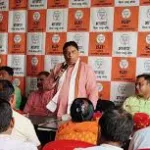DR RABIA NASEEM MUGHAL
Each year, athwart the enormous landscape of India, the aspiration to join the impressive Indian Administrative Service (IAS) seizures the imagination and ambition of lakhs of young people. For many, the stones of this dream are implanted early, often nurtured by parental pride, societal prestige, and the allure of a stable, respected government position.
With each ephemeral academic landmark, the weight of the expectation grows heavier, sometimes spinning sincere curiosity into an obligation well-defined by family or community. Hitherto, behind the admirable hining image of the IAS officer, the epitome of influence, respect, and public servicelies a realism that is seldom recognized openly.
The sheer scale of this pursuit is astounding. Every year, over a million candidates prepare and register for the UPSC Civil Services Examination, the entry to not only the IAS but also other admired roles like the IPS and IFS. Yet, against these overwhelming numbers, only a fraction, less than one percentwill eventually secure a place.
This unadorned disparity means that for every aspirant who tastes triumph, thousands of equally talented, hardworking individuals are left to cope with disappointment, dissatisfaction and distress. Often, these students dedicate their entire twenties, offering thousands of hours and enormous emotional and financial resource to persistent study, sacrificing personal milestones and the lively impulsiveness and freedom of young adulthood for a chance at the coveted post.
As years go by, the sacrifices deepen. Friends who chose different paths like private sector jobs, higher studies, entrepreneurship, progress gradually in their careers, they move cities, or start families. In the interim, individualstrapped in the preparation cycle can begin to feel ever more isolated, lonely and secluded. Their social spheres tightening as life apparently travels ahead for everyone else. This sense of stagnation is not just about lost time, it wears away self-confidence, predominantly for those who have continuously been high achievers.
Academic toppers and university gold medalists, who used to be a lifetime of accolades, now grapple with recurrent setbacks. Society and parents who are all too quick to judge, often compares a failure with individualdeficits, overlooking the pure competitiveness and unpredictabilitywhich are integralpart of the process.
A concealed cost arises from this narrow definition of success which is deeply entrenched in the psyche of many families and coaching institutes. The “IAS or nothing” approach transmutes the pursuit of a decent goal into a perilous gamble.
When one exam becomes the sole arbitrator of worth, countless other opportunities for growth, fulfillment, and contribution are forgone at its altar. Coaching centers are capitalizing on the collective anxiety thus belligerently souk the dream. They promise that hard work and perseverance will guarantee selection. This is a message that while motivating on the surface overlooks the harsh measuredreality of the probabilities.
The system spreads the belief that civil service is the only reputable field for the truly bright, when in reality; society flourishes and prospers precisely because of the varied aptitudes, talents and passions of its members, guided into innumerable professions.
It is vital to identifyand accept that failure in the UPSC exam does not equate to a lack of intelligence, diligence, or character. Most aspirants who do not succeed are exceptionally gifted and determined. The design of the process itself leaves more outside the gate than within.
Unfortunately, this reality is rarelyrecognized, which leaves many to question their own capacity, competency and value. Over time, the cumulative effect of failed attempts can result in anxiety, depression, and a sense of inadequacy. The social stigma attached to non-selection only aids to augment this agony. This makes it hard to openly discuss setbacks andpursue emotional support.
The time has come for a vital culturally edifying shift in how we prepare young people for their futures and how we collectively define achievement and failure. Career awareness programs must start early ideally in school, so that students are exposed to a far-reaching spectrum of fields like science, entrepreneurship, technology, arts, social work, international relations, journalism, policy research, and more.
Instead of pushing learners into the most prevalent or “respectable” pursuits, educators and families must adoptive honest discussion about the realities of different careers, including the civil services by conferring ‘every service is reputed, admirable and respected’. Coaching institutes should offer genuine guidance and transparent figures about outcomes, supporting alternative ambitions instead of merely selling the IAS as the final goal.
Aspirants themselves need to engross in profound self-reflection before pledgingwholly to such a challengingvoyage. It is vivacious to honestly assess whether the daily realities, responsibilities, and lifestyle of a civil servant truly match one’s interests, capacities and aptitudesor whether the impetusascends from external corroboration. Keeping alternate plans is not just sensible but essential.
Pursuing another degree, gaining work experience, or exploring a different creative endeavor does not diminish one’s worth; relatively it echoes maturity, compliance and adaptability. Failure to clear the UPSC examination should not be something to hide but a normal, even valuable part of the process of growth and advancement.
Confidence comes not from results but from the courage to own the whole journey, to draw lessons from setbacks and to pivot with purpose when needed. There is no failure, either one can win or learn and learning is greatest self-achievement.
Furthermore, it’s vital to ponder that the essence of public service is far larger than a job title. Impactful work ensues daily in social service, in grassroots social enterprises, in think tanks that shape policy, in classrooms, in hospitals, on roads, in media that exposes injustice, and in startups undertaking real-world challenges.
The realm’s advancement is the collective sum of such assorted acts of leadership and innovation. The discipline, logicalconsistency, and communication skills developed during IAS preparation are enduringpossessions, empowering aspirants to shine in countless other spheres of life. True brilliance does not reside only in those who clear a specific exam but in those who adapt, learn, persist, and contribute meaningfullywherever they may land.
Finally, the narrative must shift from glorifying narrow definitions of success to celebrating growth, adaptability, and meaningful contribution. India desires individuals who think deeply, who act boldly, and who fashion value across fields. Our society will only grow richer and more resilient by inspiring young people to explore fully, take risks and honor their own unique paths, irrespective of whether they wear the badge of the IAS.
Let your aspirations uplift your journey, not restrain it. Dream widely and wisely, embracing the world of possibilities beyond one exam and let your life be defined by empathy, curiosity, resilience, persistence, and kindnessnot by a single result. In the end, what you bring to the world through whatever path you choose matters far more than any title, and that is a truth worth holding on to.
(Author is Sr Lecturer at School education Department: Feedback: [email protected])






